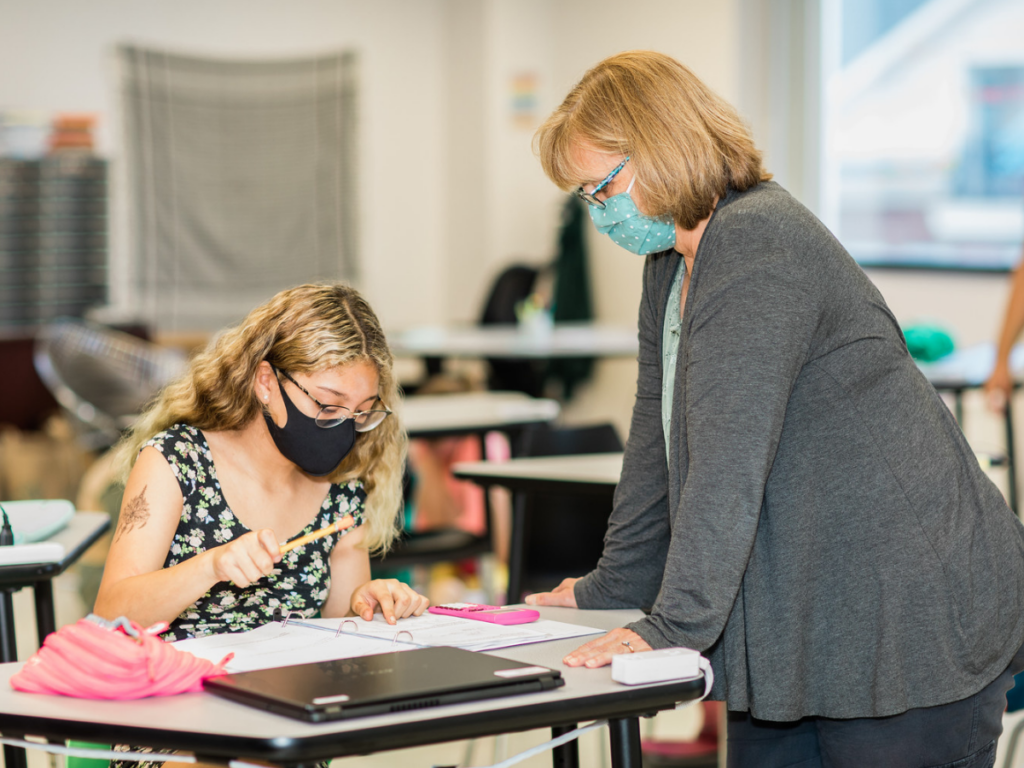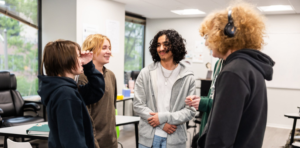TSS Teacher Credentialing and Skills

The Sycamore School (TSS) has a unique approach to learning. We utilize a mastery-based approach to meet students where they are, address any gaps in skills, and move them forward at their own pace. Learning is engaging, purposeful, and individualized. Instead of traditional grades, we offer narrative feedback and authentic assessments to tell students where they are on the path to mastery. Given our specialized approach, it’s not surprising that our teacher requirements are somewhat different than those of a traditional school.
While many of our teachers are certified, teacher certification is not our top priority. We welcome staff who are uniquely qualified to work with our students and our curriculum. They need to be creative, compassionate, and adept at creating and integrating curriculum. They need to be accomplished at…
Relationship Building: It is essential that our staff build positive relationships with students. Many of our students come to us because they fell through the cracks or their needs were not met in other educational settings. Kids want to do well and do the best they can. If they aren’t doing well, that means something is in the way. Many educators mistakenly think that a student WON’T do something when in fact, it’s that they CAN’T do something. It’s our job as teachers to figure out what our students’ barriers are to learning and to help them find success. That means, taking the time to check in with students, learn about their interests, and help them to feel comfortable and seen at school. It also means understanding each student’s unique strengths, areas of need, and what motivates them. Another important component of relationship building is consistent classroom guidelines and frontloading expectations. Students (and everyone) like knowing the rules and expectations; it helps them feel safe. Consistency also helps students with their organizational skills. It takes experience and work to establish rapport with a range of students, their unique learning profile, and to meet their needs…all while managing the classroom.
Incorporating Educational & Social-Emotional Skill Building Strategies: Many of our students struggle with executive functioning skills; other students suffer from anxiety. Some of our students have specific learning disabilities. Other students are neurotypical but may be visual or hands-on learners. So, our students need individual accommodations. They might need scaffolded assignments, wait time or assistive technology. Some students need a quiet place to work while others work better talking through assignments. Our teachers’ challenge is to apply the appropriate accommodations to the specific student based on their unique needs. That skill is almost an art form.
Flexibility, Creativity, and Differentiation: Teaching using a mastery-based model requires a lot of prep. It’s not one-size-fits-all instruction. The teacher needs to set the stage, giving students the context of the project. They need to introduce the activity and assess for background knowledge. At times, staff may introduce an activity only to realize that some or all of the students DON’T have the background knowledge required. So, they may need to pivot and create an assignment or activity to address that learning gap. Also, planning an activity or lesson is only the first step. Then, the teacher has to modify each assignment for the individual learner and/or give choices of how students will access the content, work with the content, and show what they know (e.g., Universal Design for Learning). Many of my newer teachers have commented – you can have a well-thought-out lesson but when you’re in the classroom, you may need to pivot, depending on that unique group. Teachers have to assess in the moment and adjust expectations based on the students they are working with.
Collaboration: At TSS, all core classes are co-taught. That means there are at least two lead teachers in each class who are working together to engage students in learning. TSS also creates their own curricula, so many staff are 12-month employees and spend the summers writing experience classes in teams. Staff meet with one another throughout the days and weeks, to problem solve and revise lessons to meet student needs. It’s an ongoing collaborative process.
Growth Mindset: Our staff need to be curious and open to learning. They need to have the ability and desire to learn new information, sometimes trying subjects outside their comfort zone. While a teacher may come into the school with a subject specialty, they may be asked to lead an activity that is not in their area of expertise. Whether it’s working with a student who has ASD or teaching a unit on traveling to Mars, staff may be asked to lead an activity where they have to learn about it themselves first or try some new strategies they haven’t practiced before. No matter how seasoned we are as a staff, we will inevitably come across a subject or student where we are asked to push ourselves and learn or try something new. We must keep that lens of curiosity and be open to learning in order to meet our students’ needs.
Posted in:

